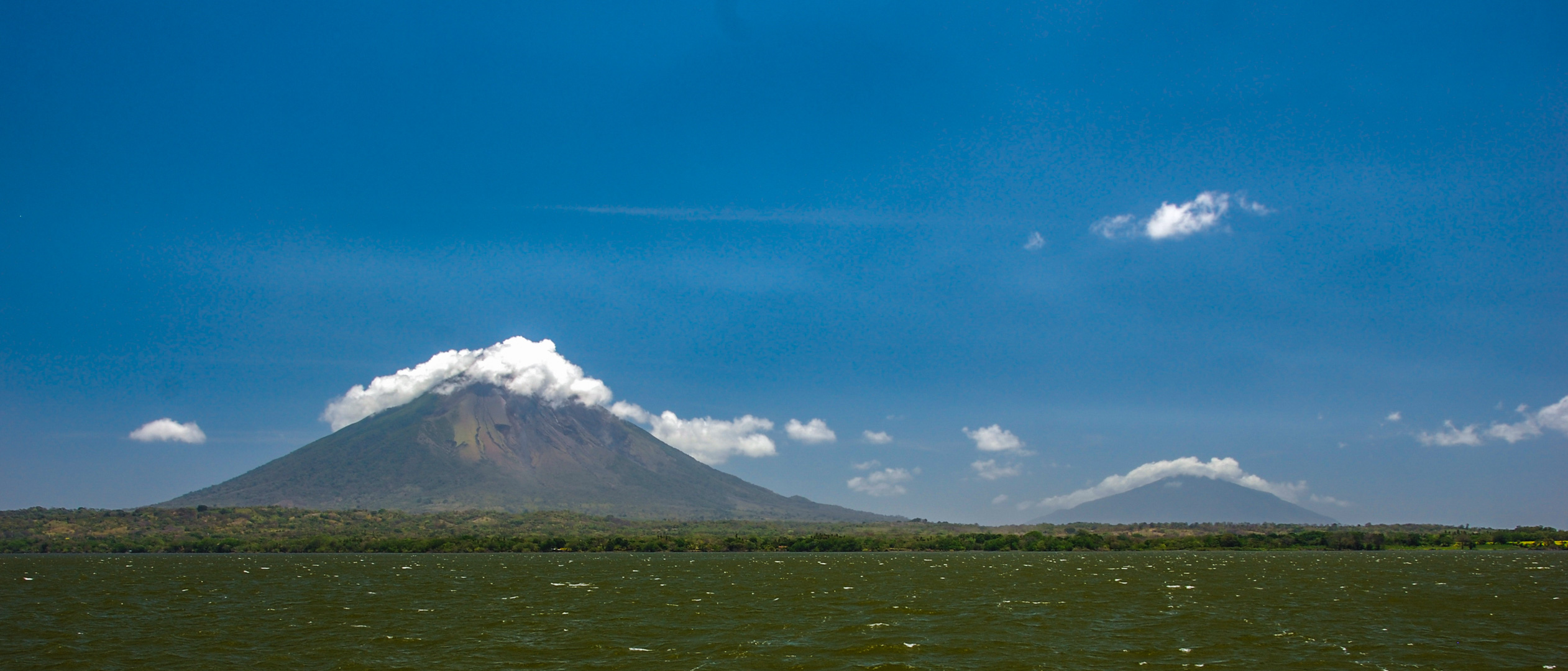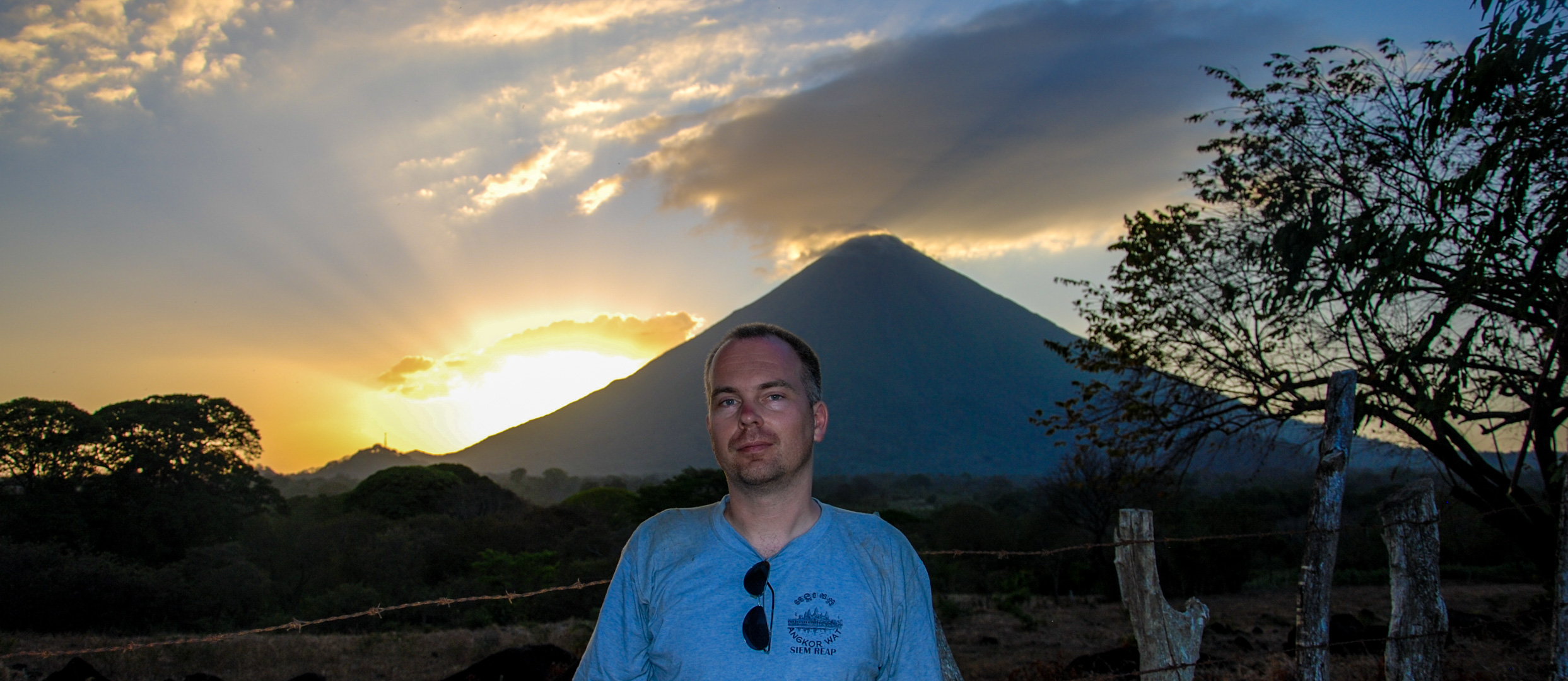Falling Down
Isla de Ometepe: a tropical island made out of twin volcanoes in the middle of a shark-infested lake. That sentence alone already sounds magical and I knew I had to visit it on my Nicaragua trip.
I could never have imagined that I would have to endure one of my toughest days ever on any of my travels on that island. I learned a lot about myself and how I handle myself in certain desperate situations.

Volcàns Concepcion and Maderas
Ascending Maderas
I left my wooden cabin at El Zoopilote in the crisp fresh air of early morning. A quick bus ride brought me to Finca Magdalena at the foot of Volcán Maderas where I met up the others of our group for today: Miguel, a local tour guide, and three women whom were all staying at the Finca.
The initial climb was pleasant and easy going, winding first through plantations and then entering the jungle. As we got higher the trail got steeper, the temperature rose, the humidity increased and the vegetation thickened. The top part of the volcanoes was often covered by a layer of clouds, like frosting on a cake, and the wet fog reduced visibility and turned the ground into slippery mud.
I kept losing my balance or slipping back down and found the climb intensive and strenuous. I also found it boring: I was staring at my feet most of the time and even when I wasn’t, there wasn’t much to see. The heavy foliage covering the mountainside possessed few breaks and views of the island were rare.
We reached the summit at noon and just minutes after arriving the sun broke through the clouds and illuminated the water-filled caldera in a soft light. We basked in the sun’s heat and enjoyed a relaxed picnic at the shore of the crater lake while munching on some of the thick and sweet bananas that could be found all over the island. I got along particularly well with Lotten, a Swedish girl from our group.
Losing Focus
Going down the mountain was even harder than going up! It was not as strenuous, but the mud and slippery stones the had proven a formidable opponent on the way up were even worse adversaries on the way down. This wasn’t helped by the fact that my attention kept drifting off and whenever I didn’t look at my feet for more than a couple of steps I invariably stepped on a slippery rock or muddy patch and lost my balance.
I really tried to pay attention on where I put my feet, but was not able to for more than a couple of minutes at a time no matter how hard I tried. I probably appeared rather comical to the rest of the group, with all the slipping and cursing. The others didn’t have the same issues and rarely slipped if at all. To me the matter was quite serious. The constant recoveries were not only was it hard on the knees but a bad fall could seriously injure me.
The large hiking boots I wore certainly didn’t help. Their plastic soles didn’t provide much traction on the slippery rocks while their thickness and rigidity made me lazy in putting down my feet. I tried to explain to the others that I was constantly slipping because I couldn’t keep my attention on my feet. It was simply too boring of a task and my thought kept drifting off to focus on more interesting matters. They didn’t understand. At all. After all, how hard could it be to just keep looking at where you put your feet for a few hours if it was important to do so?
I was reminded of elementary school. When I entered at the tender age of 6 I was so eager to learn, but I soon found out that school was terrible boring. I particularly remember learning multiplication tables for the first time. After our first lsesson I set to memorize them and on the second day I could do all the tables from 1 to 10 (even that nasty 8×7 that I always found hardest to remember). I was so proud! But the same multiplication lessons continued on the third day, and on the fourth, and the fifth, and the week after that, and the week after that and so on. I stopped paying attention after the first week.
This encounter characterized much of my career at my first elementary school and I paid less and less attention to the lessons and mostly say sat in class day-dreaming about faraway worlds and fantastical creatures. Fortunately for me my mother sensed my increasing unhappiness and was worried about my falling grades. She pulled me out of our local school and send me to a different type of school in another city. A Montessori school. This proved to be a godsend. It wasn’t until University that someone tried to dictate to me what, when and how I should learn something.
Even today when I explain to others how much difficulty I have concentrating on boring tasks, they have difficulty believing me. They think I simply want avoid the task or that I was lazy. I can imagine this is how dyslexics must feel. The enormous amount of energy you need to expend to keep your focus, how tiring it is to do so. The letters that just keep jumping around on the page. People had trouble understanding dyslexics too, thinking they were stupid or lazy.
Usually I am able to avoid or at least hide such moments where my focus wanders. I am fast enough at most tasks that a little bit of wandering isn’t really noticeable. Also, I usually do boring things like cleaning my house in intervals, 15 minutes on, 15 minutes off. Or I clean in the morning when I have more mental energy reserves.
But today I was walking on a mountain trail, and still had two out of three hours to go and darkness would fall soon after that. I simply had to find a solution. I did so by making going down into a game. I made it more difficult for myself on purpose: I had myself jump down the trail from tree to tree catching myself on the trunks, I starting counting and keeping scores, I made brief stops to take photo’s and then made back the time I lost by running down the trail at high speed. At some point I even removed my hiking boots and went on barefoot to add even more challenge. All these things made it more interesting for my brain to engage with the task again and I as soon as it paid attention again I stopped slipping. I made it to the end of the trail without falling down.
I was really tired when our group arrived back at the Finca and rather than trying to catch the last bus back to my hostel I stayed with the ladies and had a few drinks and then dinner. It meant 30-45 minutes walk back to my hostel, but I felt it was an acceptable sacrifice. This confrontation with my own limitations really has a big impact on me and I needed a bit of relaxing. Little did I know that I would meet another rarely experienced side of myself later that night.

Bushwacked
I said good night to my companions, but agreed to meet the Swedish girl Lotten the next day. She was interested in staying at my hostel tomorrow instead of here at the Finca. Somewhat refreshed I trudged off into the dark.
I always find walking in the dark interesting. My senses feel heightened, I feel more alert and more skittish. I tend to walk faster without trying to and am constantly trying to identify the origin of unseen sounds. This was compounded by the experience of being in a foreign country in a place that I didn’t feel familiar yet.
A couple of hundred meters pitch black farmland separated the Finca from the crossing near the coastal road. From this distance I could see the lights and hear the sounds of people busy with their cooking fires or playing music near. I soon passed the crossing and the houses disappeared fron view, leaving me to find my way just by the illumination of the starlight. The dark of the island mass on my left hand and the bright of the lake on my right were my guide as the road followed the curve of the coast.
After some minutes I heard the distinct click-clack of another person’s feet occasionally hitting the cobblestones of the road behind me. I turned but didn’t see any light or movement behind me. This person must also be walking the road alone in the dark, which wasn’t alarming to me by itself. What did alarm me was that the sound of footsteps became louder and louder. I found this odd because my tempo was already pretty high: I had the pace of a tall and alarmed foreigner walking at night in a strange country.
The sound of footsteps drew even closer but then remained level for what seemed like a few minutes. This was even odder, why would my chaser walk noticeably faster then suddenly rein in his pace? I didn’t trust the matter and was racking my brain for a good opening sentence in Spanish that addressed the situation. If I could see and open a conversation with my chaser then I could at least evaluate the danger better and possible defuse the situation. I was thinking something on the line of “Espero tu no eres estupido, no?”
I slowed down and started to turn around when a heavy object came down hard on my left shoulder and then bounced off. I spun around faster and the sparse starlight revealed the dark shape of a local man holding a big wooden club in his hands, recognizable by the slightly lighter gray color of the wood. I didn’t even think about that next moment, I just reacted instinctively: I immediately attacked the man. I think his body posture seemed hesitant and he backpedalled as quickly as I advanced. I don’t remember if I yelled something aggressive, I might have. He dropped his club and ran away into the darkness as I chased him for about twenty paces or so.
I stopped and checked my shoulder. No cuts or bruises and my clothes still seemed intact. It wasn’t even painful, but that might just be the adrenaline. He probably was trying to hit my head, but either the darkness or the fact that I was just turning around might have foiled his aim. I felt fairly calm. my heart rate went down fast and I continued walking resolved to alert the next person I could find as soon as I entered an inhabited area again. It was probably not an experienced robber but just someone who saw an opportunity and was probably pretty scared of the whole incident.
Some ten minutes later I got my biggest scare of the day. I was walking along a barbed wire fence when suddenly out of nowhere some farmers dog came howling and barking wildly out of the darkness. It stopped at the fence just inches from me but I almost jumped out of my shoes from shock and fright. Of the two nightly encounters, the one with the dog definitely had scared me way more than the robber. Another ten minutes and I was back at the hostel, happily accepting the beer that my fellow travellers offered me.
It certainly had been an interesting day. There are usually only a few moment in your life when you get to know how you would react in extreme situations. I learned from this encounter with the robber than when I threatened my instinct tends be to fight rather than to flee or to freeze.



